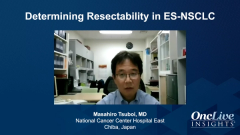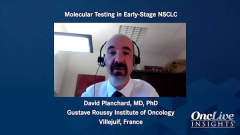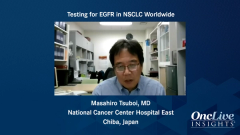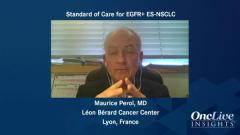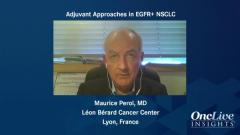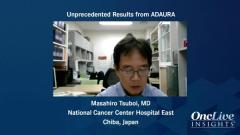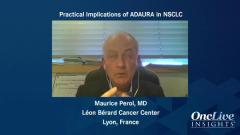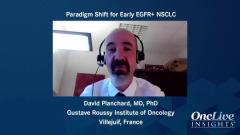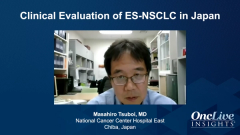
Unprecedented Results from ADAURA
Episodes in this series

Transcript:
Masahiro Tsuboi, MD: The ADAURA study has osimertinib as adjuvant therapy in patients with completely resected surgical stage IB, II, and IIIA EGFR mutation-positive non–small cell lung cancer. In ADAURA, 682 patients were randomized into a 1:1 ratio to the…osimertinib or placebo. The primary end point was disease-free survival [DFS] for the stage II and IIIA disease. The secondary end point was disease-free survival for the overall population. The primary end point of ADAURA was met in patients with stage II and IIIA disease. An impressive hazard ratio for the disease-free survival of 0.17 was observed, equating to 83% reduction in the risk of disease recurrence with osimertinib vs placebo. In the overall population of patients with stage IB, II, and IIIA disease, a hazard ratio of 0.20 was observed, equating to 80% reduction in the risk of disease recurrence with osimertinib. The patients who received osimertinib had fewer…than those who received the placebo, with a lower incidence of metastatic disease in those patients with recurrence, including fewer CNS [central nervous system] recurrence events.
Adjuvant osimertinib demonstrated a clinically meaningful improvement in the CNS disease-free survival compared with placebo. It had a hazard ratio of 0.18, equating to 82% reduction in the risk of disease recurrence. CNS disease recurrence was less likely with osimertinib compared with placebo, with a conditional probability of less than 1% after 18 months with osimertinib.
I conclude that the ADAURA trial demonstrated that adjuvant osimertinib was highly statistically significant with the clinical meaning for improvement in disease-free survival and reduction of risk of the local and distant recurrence, as well as improving CNS metastases and CNS disease-free survival in the patients with complete resected stage IB, II, or IIIA EGFR mutation-positive non–small cell lung cancer. Also, there is a limitation that the maturity of both DFS and OS [overall survival] are low, given the reality that the patients with early stage lung cancer miss the chance to be cured once there is recurrence. I believe that prolonged DFS with osimertinib adjuvant is useful information for the patient hoping for a cure. In the future, we must consider this in the patient selection because there is some financial toxicity in each country.
David Planchard, MD, PhD: In the ADAURA trial, which compared patients with stage IB to IIIA who have been operated on, they might receive adjuvant chemotherapy, so that is the standard of care after they had been randomized to receive either osimertinib or placebo within 3 years. We have what has been currently presented and recently published. These are early data, so we need to be cautious, but they’re really impressive. The primary end point was disease-free survival, and the hazard ratio was around 0.17 for the whole population. That means you have a reduction of the risk of deaths or recurrence of the disease—around 83% in this population—if they received osimertinib within 3 years. At 3 years in the osimertinib arm, disease-free survival, for example, is around 80%; in the placebo arm, it’s around 30%. The magnitude of difference is unprecedented. Whatever the previous trial in the EGFR-mutated population that has been already reported, we never observed this huge improvement in disease-free survival in favor of osimertinib. These are early data, so the trial was unblinded at 3 years before it was expected because of this important magnitude of benefit.
That means we don’t have the translation, and we don’t have the result. This huge improvement in disease-free survival in the osimertinib arm will translate to an overall survival benefit. I cannot imagine that it will not translate to an improvement in overall survival for this population when you see this magnitude of benefit. Whatever does not translate in an increment in overall survival, the patient should know that at 3 years, 80% achieve disease-free survival. In the other arm, it’s only 30% disease-free survival. It’s enough to make it as a standard of care for the EGFR population after thoracic surgery. It’s unprecedented with this population.
Transcript Edited for Clarity


